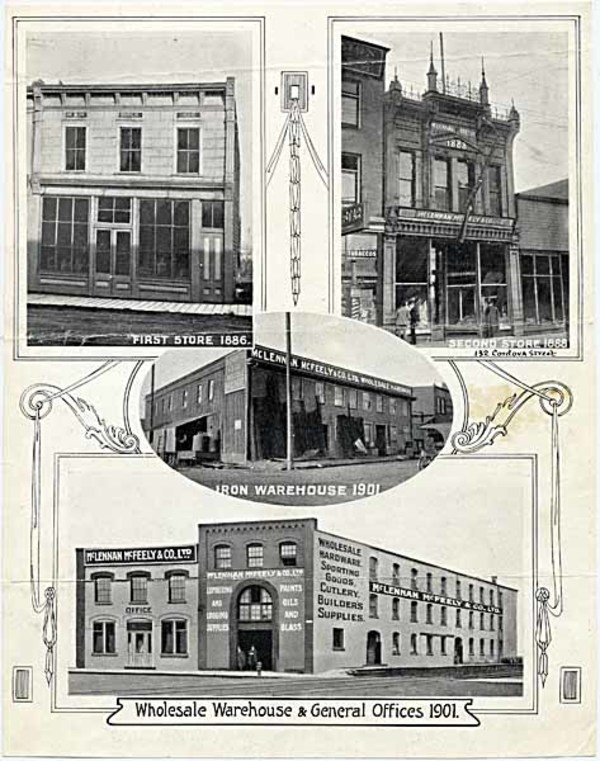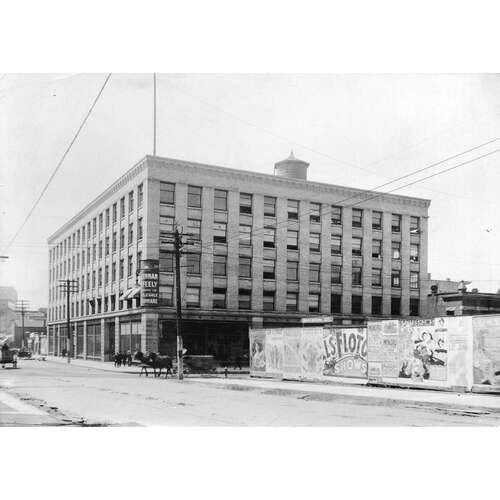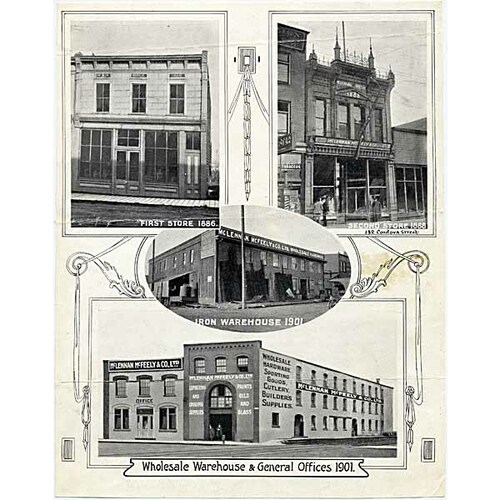
Source: Link
McLENNAN, ROBERT PURVES, tinsmith, businessman, politician, and banker; b. 7 Dec. 1861 in Pictou, N.S., seventh of the ten children of James Purves McLennan, a painter, and Eliza Anne Harrington; m. 23 Nov. 1887 Bessie Archibald McKenzie in River John, N.S., and they had ten children, nine of whom survived infancy; d. 27 July 1927 in Vancouver.
Robert Purves McLennan attended Pictou Academy until he was 15, at which time he left to learn the tinsmithing trade and hardware business. In 1882 he went to Winnipeg, then in the midst of a boom, and worked as a tinsmith. When the boom collapsed he returned to Nova Scotia for a brief visit before moving to Victoria, where he arrived in September 1884. There he opened a shop, making galvanized iron cornices and installing tin roofing. The following year he invited Edward John McFeely, whom he had met in Winnipeg, to join him in business. The firm of McLennan and McFeely prospered, becoming dealers in stoves and tinware in addition to carrying on its roofing work.
By May 1886 McLennan and McFeely had expanded to Vancouver. The fire of 13 June which destroyed most of the town spared their building, then under construction, and shortly afterwards the company began to build stoves and deal in other metal wares. During the next few years it added many hardware and house-furnishing lines and advertised as general roofers, plumbers, and gas fitters. The firm’s involvement in roofing, plumbing, and stove making was phased out in the early 1890s in order for it to focus on wholesale and retail activities. In 1891 McLennan, in Victoria, employed 13 persons and McFeely, in Vancouver, 17.
Victoria experienced a business slump in 1893. McLennan and McFeely decided to sell their business there and concentrate on Vancouver. By 1895 McLennan had moved to Vancouver with his family. McLennan, McFeely and Company Limited Liability was incorporated on 3 April 1895 with an authorized capital of $150,000 in 1,500 shares. The partners’ wives held the largest number of shares, 351 each, while their husbands held 39 each. McFeely was named president and McLennan vice-president.
In 1898, a year after the beginning of the Klondike gold rush, McLennan took a load of merchandise to Dawson, Y.T., reportedly planning to stay for only several weeks. He remained five years. The firm was successful there and quickly rebuilt after losing a building worth $12,000 and stock valued at $6,000 in the fire of 26 April 1899. During 1899 and 1900 it had branches in Atlin and Bennett, in northern British Columbia. In the summer of 1900 the partners shipped to Dawson over 800 tons of merchandise worth $200,000, on which they paid $115,000 in freight charges.
While in Dawson, McLennan became involved in several other enterprises. In 1900 he was the principal shareholder in the Ridge Cable Company; a partner, Hill M. Henning, managed the operation. That same year he served as president of the Dawson City Water and Power Company Limited. In October 1902 McLennan and McFeely sold its retail hardware business in Dawson to the Yukon Hardware Company, formed that year. McLennan then concentrated on the wholesale trade. In January 1903, strongly supported by the Daily Klondike Nugget, he was elected the second mayor of Dawson. He served one term, during a period when the city was in decline, and did not seek re-election. Although he left for Vancouver in early 1904, the company continued in Dawson for some time afterwards.
In March 1904 McLennan and McFeely purchased land in Vancouver along Cordova Street East for $40,000. The five-storey building it erected would be outgrown by 1911. The firm raised its capital in 1905 to $500,000 and again in 1909 to $1,000,000. The partners’ wives were still the largest shareholders. In 1913 the company was restructured in order to expand its capital to $5,000,000.
Elected vice-president of the Vancouver Board of Trade in 1905, McLennan served as president in 1906–7 and remained on its council until 1912. He had also been elected a trustee of the Vancouver School Board in 1905 and he served two two-year terms. A lifelong Liberal, he contested the provincial general election of 2 Feb. 1907 in the five-member riding of Vancouver City. After a hard-fought campaign, he took sixth place, behind five Conservatives. That year he became a member of the Royal Institution for the Advancement of Learning of British Columbia, which sought to establish a co-educational college connected to McGill University.
Along with other Vancouver businessmen who felt that Canada’s central banks were not adequately supporting British Columbia’s industry and commerce, McLennan promoted the Chartered Bank of British Columbia in 1907. The group combined in 1908 with another seeking the same goals and the Bank of Vancouver was incorporated on 3 April with a capital stock of $2,000,000. It opened two years later under McLennan’s presidency. Although financially very strong, the directors lacked banking experience. Difficult economic conditions started in the autumn of 1912 and were followed by the withdrawal from the province of British capital, lengthy coal strikes, and, in 1913, rumours of impending war. Investment dried up, real estate speculation ceased, and construction halted. The bank had expanded too quickly and had some problematic loans. The collapse of the Dominion Trust Company in October 1914 was a crushing blow, since public confidence in financial institutions faltered. Depositors fled the bank, which suspended payment on 14 December.
In 1912 McLennan had purchased a farm of approximately 335 acres on Gambier Island, in Howe Sound, and from then until his death he may have spent much of his time and wealth improving it. His interest in the farm led to his involvement with the Vancouver Exhibition Association, of which he was president in 1927. In 1925 McLennan had campaigned as a Liberal in the federal riding of Vancouver-Burrard, pointing out that the Liberal government of Prime Minister William Lyon Mackenzie King* had lowered freight rates and provided grain elevators and permanent docks. He was defeated by Conservative John Arthur Clark. He died in 1927 after an operation to remove a gallstone, leaving an estate with a final net value of $191,483. McFeely, his partner of more than 40 years, died ten months later. In 1928 the firm became known as McLennan, McFeely and Prior Limited.
An enterprising and energetic businessman who was willing to take risks, Robert Purves McLennan founded a business that would continue until the 1960s to be a landmark for many British Columbians. Civic-minded, he had sought to improve the communities in which he lived. He achieved great financial success, perhaps at the expense of his relations with his family, with whom he was not close.
BCA, GR-1415, file 12346; GR-1422, file 7739; GR-1438, files A16568, BC00226; GR-2951, no.1927-09-383900 (mfm.). LAC, RG 19, 228, file 616-2; RG 31, C1, 1871, Pictou, N.S., subdist.F, subdiv.1: 42; 1881, Pictou, subdist.F: 74, 75; 1891, Victoria, James Bay Ward: 12; 1901, Vancouver, subdist.D, subdiv.7: 1; Dawson, Y.T., subdist.F, subdiv.14: 3. Private arch., R. P. McLennan (Surrey, B.C.), Family bible. Daily Colonist (Victoria), 9 July 1885, 4 Dec. 1887, 11 Dec. 1894, 5 April 1895, 22 Dec. 1907. Daily Klondike Nugget (Dawson), 6 Dec. 1900; 3 Jan., 5 Feb. 1901; 6 Oct., 29 Dec. 1902; 6 Jan. 1903. Dawson Daily News (Dawson), September 1899, special mining ed. Klondike Nugget (Dawson), 29 April 1899. Monetary Times (Toronto), 21 Dec. 1907; 14 March 1908; 25 Jan. 1913; 16 Jan., 27 March, 8 Dec. 1914. Vancouver Daily Advertiser, 8 May, 5 July 1886. Vancouver Daily Province, 1904–27. Vancouver Morning Sun, 19 Sept., 9, 30 Oct. 1925; continued as Evening Sun, 28, 31 July 1927. B.C., Legislative Assembly, Sessional papers, reports on public schools, 1902/3–1905/6. Canadian annual rev., 1906. Directory, Alaska–Yukon, 1903, 1907–8; B.C., 1884–1910; Dawson, 1901; Vancouver, 1887–90, 1896, 1899–1900, 1905–11. Electoral hist. of B.C. E. O. S. Scholefield and F. W. Howay, British Columbia from the earliest times to the present (4v., Vancouver, 1914), 4. Vancouver Board of Trade, Annual report, 1904/5–1912/13.
Cite This Article
Ronald Greene, “McLENNAN, ROBERT PURVES,” in Dictionary of Canadian Biography, vol. 15, University of Toronto/Université Laval, 2003–, accessed March 4, 2026, https://www.biographi.ca/en/bio/mclennan_robert_purves_15E.html.
The citation above shows the format for footnotes and endnotes according to the Chicago manual of style (16th edition). Information to be used in other citation formats:
| Permalink: | https://www.biographi.ca/en/bio/mclennan_robert_purves_15E.html |
| Author of Article: | Ronald Greene |
| Title of Article: | McLENNAN, ROBERT PURVES |
| Publication Name: | Dictionary of Canadian Biography, vol. 15 |
| Publisher: | University of Toronto/Université Laval |
| Year of publication: | 2005 |
| Year of revision: | 2005 |
| Access Date: | March 4, 2026 |




